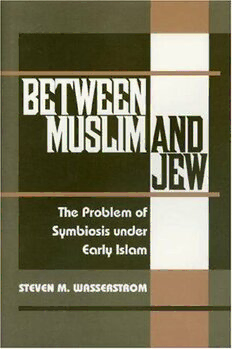
Between Muslim and Jew : The Problem of Symbiosis under Early Islam PDF
Preview Between Muslim and Jew : The Problem of Symbiosis under Early Islam
STEVEN M. WASSERSTROM Between Muslim and Jew The Problem of Symbiosis Under Early Islam J'RIKCl~lOI\ (Lt.~\<.\ I t8RAR'i Between Muslim and Jew Between Muslim and Jew THE PROBLEM OF SYMBIOSIS UNDER EARLY ISLAM STEVEN M. WASSERSTROM PRINCETON UNIVERSITY PRESS PRINCETON, NEW JERSEY Copyright © 1995 by Princeton University Press Published by Princeton University Press, 41 William Street, Princeton, New Jersey 08540 In the United Kingdom: Princeton University Press, Chichester, West Sussex AH Rights Reserved Library of Congress Cataloging-in-Publication Data \,Vasserstrom, Steven M. Between Muslim and Jew : the problem of symbiosis under early Islam / Steven M. Wasserstrom. p. cm. Includes bibliographical rekrences (p. ) and index. ISBN 0-691-03455-9 I. Islam-Relations-Judaism. 2. Judaism-Relations-Islam. 3. Jews-Islamic Empire-Inrellecrual life. 4. Judaism-Islamic Empire-History. I. Title. BP173.J8W38 1995 296.3'872-dc20 94-43430 This book has been composed in Galliard Princeton University Press books arc printed on acid-free paper and meet the guidelines for permanence and durability of the Committee on Production Guidelines for Book Longevity of the Council on Library Resources Printed in the United States of America by Princeton Academic Press 2 3 4 5 6 7 8 9 10 CONTENTS PREFACE vu INTRODUCTION 3 PART I: TRAJECTORIES CHAPTER ONE Who Were the Jews? Problems in Profiling the Jewish Community under Early Islam 17 CHAPTER TWO The Jewish Messiahs of Early Islam 47 PART II: CONSTRUCTIONS CHAPTER THREE Shi'ite and Jew between History and Myth 93 CHAPTER FOUR Jewish Studies and Comparative Religion in the Islamicate Renaissance 136 PART III: INTIMACIES CHAPTER FIVE Origins and Angels: Popular and Esoteric Literature in Jewish-Muslim Symbiosis 167 CHAPTER SIX Conclusion: Reflections on the History and Philosophy of Symbiosis 206 BIBLIOGRAPHY 239 INDEX 279 PREFACE AN AUfHOR is of course responsible for the flaws of his or her text. Still, ~chol~rship largely remains a collective exercise, necessarily meaningless in isolation and usually enhanced by collegial interaction. The present work is no exception to these rules. Marilyn Waldman, my first teacher in the study of Islam, a true friend and revered colleague, read, heard, or responded to m~ich that found its way into this book. She has encouraged me in more ways than I could count, all the while providing for me a model of humane, creative, engaged scholarship. Ad meah ve-esrim. I remain thankful that Michael Wickens, my master in all aspects of the Arabic language, and Mahmoud Ayoub, who guided me into the study of Shi'a Islam, were patient with their pupil. The help of Fred M. Donner came at a crucial time during my stay in Chicago. Over the years, Gordon Darnell Newby, Ze'ev Brinner, and David J. Halperin consistently have given support and counsel. Invitations from Mar tin Jaffee, Richard Martin, and Jacques Waardenburg provided forums for the early venting of ideas. Camilla Adang, Juan Campo, Reuven Firestone, Rawley Grau, Sidney Griffith, Joel Kraemer, Azim Nanji, John Reeves, Kevin Reinhart, Aziz Sachedina, Sarah Stroumsa, and Elliot Wolfson have helped in various ways, all of which mean much to me. May I be forgiven for the inadvertent omission of anyone else who deserves to be named here. At Recd College, I am grateful for the support of Provosts Marsh Cronyn and Doug Bennett, as well as Dean Linda Mantel. For electronic aid, I thank Marianne Colgrove, Chris Lasell, and Johanna Turner. Heroic labors were provided by the Interlibrary Loan staff~ who tolerated a sustained barrage of arcane requests. I particularly appreciate the considerable efforts of Sam Sayre, Michael Gaunt, Wendy Falconer, and Kristine Hunter. I thank the editors and publishers of the following publications for their permission to use materials originally printed by them: "Jewish Pseudepi grapha in Muslim Literature: A Bibliographical and Methodological Sketch," in Tracing the Threads: The Vitali~y ofJ ewish Pseudepigrapha, edited by John Reeves (Scholars Press: Atlanta, 1994), 87-115; ''The Shi'is Arc the Jews of Our Community," Israel Oriental Studies 14:297-325; "The 'Isawiyya Revisited," Studia Islamica 75 (1992): 57-80; "Recent Works on the 'Crea tive Svmbiosis' of Judaism and Islam," Religious Studies Review 16 ( 1990): 42-47; "The Magical Texts in the Cairo Genizah," in After Ninety Years ef Genizah Research (1897-1987), ed. Stefan Reif and Joshua Blau (Cambridge University Press: Cambridge, 1992), 160-66; «The Delay of Maghrib: A Study in Comparative Polemics," in Logos Islamikos: Studi~ Is~a"!iica in H_on orem Gem-;gii Michaelis Wickens, ed. Roger M. Savory and ~iom~ms A. Ag~us, Papers in Mediaeval Studies, vol. 6 (Pontifical Institute of Mediaeval Studies: Toronto, 1984): 269-86. Material support that made this work possible came from the Social Sci- viii PREFACE ence and Humanities Research Council of Canada; the Vollum Junior Fellow ship at Reed College; and the American Council of Learned Societies. I thank Steven Gardiner and Lainie Reich for bringing some order to a disheveled manuscript. Cathie Brettsclmeider originally showed confidence in this book at a very early stage in its development. I thank her, my subsequent editors at Princeton University Press, Ann Wald and Sara Mullen, and my assiduous copyeditor, Cindy Crumrine, for all their help, encouragement, and hard work. Pesha Rose and Shulamit Reba have never known a time when their father was not working on "the book." I hope that some day, on reading it, they will find the wait worthwhile. "The book" is dedicated to their mother, Judith Lynn Margles, who knows why. Between Muslim and Jevv
